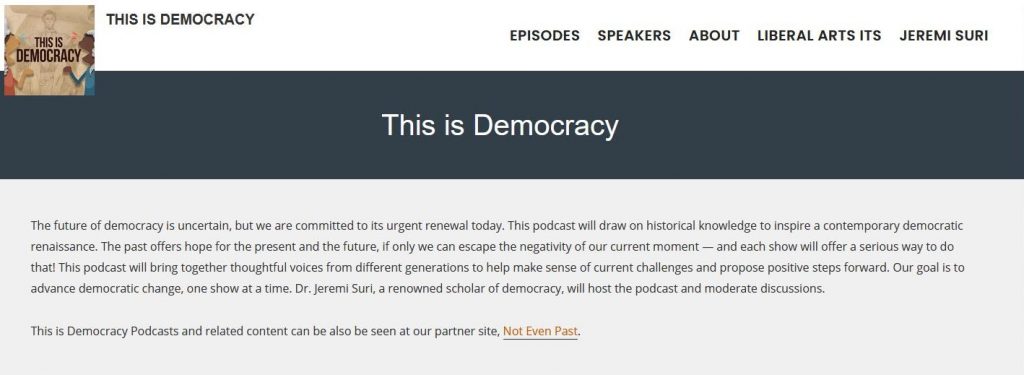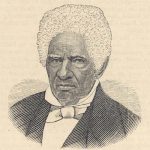
Not Even Past is proud to partner with This is Democracy, a groundbreaking podcast that brings together thoughtful voices from different generations to help make sense of current challenges and propose positive steps forward. This is Democracy Reading Lists are designed to accompany the podcast interview and to provide additional, curated readings for anyone interested in the topic under discussion.
For Episode 128 of This is Democracy, Jeremi and Zachary Suri hosted Dr. Geoffrey Kabaservice to discuss the mid-twentieth-century history of the Republican Party and what that can inform us about where the party might be going from where it is today.

…there used to be considerable overlap and now there is none. There’s complete separation between the two parties, the most liberal member of the Republican Party is well to the right of the most conservative member of the Democratic Party.
Dr. Geoffrey Kabaservice
Listen to the podcast below or access it here.
For further readings on the Republican Party, Dr. Geoffrey Kabaservice recommends the following five books.

Geoffrey Kabaservice, Rule and Ruin: The Downfall of Moderation and the Destruction of the Republican Party, from Eisenhower to the Tea Party (Oxford: Oxford University Press, 2012).
“The chaotic events leading up to Mitt Romney’s defeat in the 2012 election indicated how far the Republican Party had rocketed rightward away from the center of public opinion. Republicans in Congress threatened to shut down the government and force a U.S. debt default. Tea Party activists mounted primary challenges against Republican officeholders who appeared to exhibit too much pragmatism or independence. Moderation and compromise were dirty words in the Republican presidential debates. The GOP, it seemed, had suddenly become a party of ideological purity.
Except this development is not new at all. In Rule and Ruin, Geoffrey Kabaservice reveals that the moderate Republicans’ downfall began not with the rise of the Tea Party but about the time of President Dwight Eisenhower’s farewell address. Even in the 1960s, when left-wing radicalism and right-wing backlash commanded headlines, Republican moderates and progressives formed a powerful movement, supporting pro-civil rights politicians like Nelson Rockefeller and William Scranton, battling big-government liberals and conservative extremists alike. But the Republican civil war ended with the overthrow of the moderate ideas, heroes, and causes that had comprised the core of the GOP since its formation. In hindsight, it is today’s conservatives who are “Republicans in Name Only.”
Writing with passionate sympathy for a bygone tradition of moderation, Kabaservice recaptures a time when fiscal restraint was matched with social engagement; when a cohort of leading Republicans opposed the Vietnam war; when George Romney–father of Mitt Romney–conducted a nationwide tour of American poverty, from Appalachia to Watts, calling on society to “listen to the voices from the ghetto.” Rule and Ruin is an epic, deeply researched history that reorients our understanding of our political past and present.
Today, following the Republicans’ loss of the popular vote in five of the last six presidential contests, moderates remain marginalized in the GOP and progressives are all but nonexistent. In this insightful and elegantly argued book, Kabaservice contends that their decline has left Republicans less capable of governing responsibly, with dire consequences for all Americans. He has added a new afterword that considers the fallout from the 2012 elections.”

Julian Zelzier, Burning Down the House: Newt Gingrich, the Fall of a Speaker, and the Rise of the New Republican Party (New York: Penguin, 2020).
“When Donald Trump was elected president in 2016, President Obama observed that Trump “is not an outlier; he is a culmination, a logical conclusion of the rhetoric and tactics of the Republican Party.” In Burning Down the House, historian Julian Zelizer pinpoints the moment when our country was set on a path toward an era of bitterly partisan and ruthless politics, an era that was ignited by Newt Gingrich and his allies. In 1989, Gingrich brought down Democratic Speaker of the House Jim Wright and catapulted himself into the national spotlight. Perhaps more than any other politician, Gingrich introduced the rhetoric and tactics that have shaped Congress and the Republican Party for the last three decades. Elected to Congress in 1978, Gingrich quickly became one of the most powerful figures in America not through innovative ideas or charisma, but through a calculated campaign of attacks against political opponents, casting himself as a savior in a fight of good versus evil. Taking office in the post-Watergate era, he weaponized the good government reforms newly introduced to fight corruption, wielding the rules in ways that shocked the legislators who had created them. His crusade against Democrats culminated in the plot to destroy the political career of Speaker Wright.
While some of Gingrich’s fellow Republicans were disturbed by the viciousness of his attacks, party leaders enjoyed his successes so much that they did little collectively to stand in his way. Democrats, for their part, were alarmed, but did not want to sink to his level and took no effective actions to stop him. It didn’t seem to matter that Gingrich’s moral conservatism was hypocritical or that his methods were brazen, his accusations of corruption permanently tarnished his opponents. This brand of warfare worked, not as a strategy for governance but as a path to power, and what Gingrich planted, his fellow Republicans reaped. He led them to their first majority in Congress in decades, and his legacy extends far beyond his tenure in office. From the Contract with America to the rise of the Tea Party and the Trump presidential campaign, his fingerprints can be seen throughout some of the most divisive episodes in contemporary American politics. Burning Down the House presents the alarming narrative of how Gingrich and his allies created a new normal in Washington.”

Rick Perlstein, Before the Storm: Barry Goldwater and the Unmaking of the American Consensus (New York: Hill and Wang, 2001).
“Acclaimed historian Rick Perlstein chronicles the rise of the conservative movement in the liberal 1960s. At the heart of the story is Barry Goldwater, the renegade Republican from Arizona who loathed federal government, despised liberals, and mocked “peaceful coexistence” with the USSR. Perlstein’s narrative shines a light on a whole world of conservatives and their antagonists, including William F. Buckley, Nelson Rockefeller, and Bill Moyers. Vividly written, Before the Storm is an essential book about the 1960s.”

Heather Cox Richardson, To Make Men Free: A History of the Republican Party (New York: Basic Books, 2014).
“When Abraham Lincoln helped create the Republican Party on the eve of the Civil War, his goal was to promote economic opportunity for all Americans, not just the slaveholding Southern planters who steered national politics. Yet while visionary Republicans like Teddy Roosevelt and Dwight Eisenhower shared Lincoln’s egalitarian dream, their attempts to use government to guard against the concentration of wealth have repeatedly been undone by the country’s moneyed interests and members of their own party. Ronald Reagan’s embrace of big business—and the ensuing financial crisis—is the latest example of this calamitous cycle, but it is by no means the first.
In To Make Men Free, celebrated historian Heather Cox Richardson traces the shifting ideology of the Grand Old Party from the antebellum era to the Great Recession, showing how Republicans’ ideological vacillations have had terrible repercussions for minorities, the middle class, and America at large. Expansive and authoritative, To Make Men Free explains how a relatively young party became America’s greatest political hope—and, time and time again, its greatest disappointment.”

George Packer, The Unwinding: An Inner History of the New America (New York: Farrar, Straus, and Giroux, 2013).
“American democracy is beset by a sense of crisis. Seismic shifts during a single generation have created a country of winners and losers, allowing unprecedented freedom while rending the social contract, driving the political system to the verge of breakdown, and setting citizens adrift to find new paths forward. In The Unwinding, George Packer, author of The Assassins’ Gate: America in Iraq, tells the story of the United States over the past three decades in an utterly original way, with his characteristically sharp eye for detail and gift for weaving together complex narratives.
The Unwinding journeys through the lives of several Americans, including Dean Price, the son of tobacco farmers, who becomes an evangelist for a new economy in the rural South; Tammy Thomas, a factory worker in the Rust Belt trying to survive the collapse of her city; Jeff Connaughton, a Washington insider oscillating between political idealism and the lure of organized money; and Peter Thiel, a Silicon Valley billionaire who questions the Internet’s significance and arrives at a radical vision of the future. Packer interweaves these intimate stories with biographical sketches of the era’s leading public figures, from Newt Gingrich to Jay-Z, and collages made from newspaper headlines, advertising slogans, and song lyrics that capture the flow of events and their undercurrents.
The Unwinding portrays a superpower in danger of coming apart at the seams, its elites no longer elite, its institutions no longer working, its ordinary people left to improvise their own schemes for success and salvation. Packer’s novelistic and kaleidoscopic history of the new America is his most ambitious work to date.”
The views and opinions expressed in this article or video are those of the individual author(s) or presenter(s) and do not necessarily reflect the policy or views of the editors at Not Even Past, the UT Department of History, the University of Texas at Austin, or the UT System Board of Regents. Not Even Past is an online public history magazine rather than a peer-reviewed academic journal. While we make efforts to ensure that factual information in articles was obtained from reliable sources, Not Even Past is not responsible for any errors or omissions.



